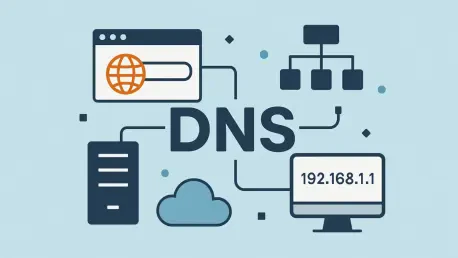In the realm of cybersecurity, Rupert Marais stands as a formidable expert, especially in endpoint and device security, cybersecurity strategies, and network management. With an industry that mostly highlights firewalls and antivirus solutions, Rupert brings to light an often-overlooked yet crucial component: the Domain Name System (DNS). Serving as a linchpin in internet operations, DNS plays an intrinsic role in network security but remains a favored target for cyber attackers. Throughout this discussion, we explore the nuances of DNS security and its fundamental importance in today’s digital landscape.
Why is DNS considered a core part of internet infrastructure?
DNS functions almost like the backbone of the internet. Whenever you enter a domain name, DNS translates that into an IP address so computers can understand and connect with each other. It essentially acts as the internet’s address book, allowing humans to use easy-to-remember domain names rather than numerical IP addresses. Without it, every online action would require knowing complex strings of numbers, which isn’t practical.
How does DNS function like the internet’s address book?
Fundamentally, DNS translates the human-friendly domain names we type into the numerical IP addresses that computers use. Whenever you want to visit a website, the DNS ‘looks up’ this name and directs your request to the appropriate server. It’s as if DNS is constantly updating and maintaining an address book to streamline internet navigation.
Why is DNS a prime target for cyber attackers?
Since DNS is involved in almost every online transaction, attackers see it as a valuable point to exploit. It’s part of nearly every interaction, and because traditional security measures often overlook it, attackers can use DNS to execute various stealthy and high-impact attacks. It’s that broad scope and the inherent lack of security that make DNS such a tempting target.
What makes DNS-based attacks especially attractive to cyber attackers?
The attractiveness lies in the design of DNS itself—it wasn’t initially built with strong security measures. Many DNS queries are unencrypted and unauthenticated, making them hard to monitor under most conventional security systems. This lack of visibility allows attackers to conduct activities like redirecting traffic or stealing data without immediate detection.
Can you describe some common DNS-based attacks and how they affect businesses?
Certainly. Common DNS-based attacks include DNS spoofing, hijacking, tunneling, and DDoS attacks. In spoofing, attackers trick the DNS resolver to direct users to fake websites, leading to data theft or fraud. Hijacking involves changing DNS settings to reroute a user’s traffic through malicious servers. DNS tunneling allows attackers to exfiltrate data through DNS queries, bypassing security measures like firewalls. Finally, DDoS attacks overwhelm DNS servers to make websites or apps inaccessible, potentially disrupting business operations significantly.
What is DNS spoofing and how does it typically work?
DNS spoofing involves tricking a DNS resolver into returning a malicious IP address instead of the legitimate one. When a user attempts to visit a trusted website, they could instead be directed to a fraudulent site that looks identical. Unsuspecting users may input sensitive information, like passwords or financial details, which attackers then exploit.
How can DNS hijacking compromise a network?
In DNS hijacking, attackers gain control over a DNS server or modify DNS records to redirect traffic. This redirection can send users to malicious sites or intercept their data. Such an attack can compromise network integrity, enabling data theft or allowing malware to propagate unchecked.
What is DNS tunneling and why is it a concern for organizations?
DNS tunneling masks data transfers under the guise of normal DNS queries. Attackers use it to sneak data out of a network, effectively bypassing security controls like firewalls. This method often remains hidden, posing significant risks to organizations as sensitive information can be exfiltrated without raising alarms.
How do DDoS attacks affect DNS servers and, consequently, online services?
DDoS attacks target DNS servers by overwhelming them with excessive traffic, rendering them incapable of handling legitimate requests. As a result, websites become unreachable, and online services can crash, leading to service disruptions and financial losses. Without access to DNS, users can’t resolve domains, causing widespread connectivity issues.
Why is securing DNS considered a frontline defense against cyber attacks?
Securing DNS means addressing vulnerabilities at the entry point of most cyber interactions. By safeguarding DNS, organizations can prevent threats from penetrating deeper into their systems. It’s like having a security checkpoint at the very inception of network interactions, blocking malicious activities before they escalate.
What role does DNS play in early threat detection and defense?
DNS acts like a sentinel by monitoring and analyzing queries for suspicious patterns or anomalies. It can detect things like malware trying to communicate with its command center or users accessing fraudulent sites. In this way, DNS provides crucial intelligence on potential threats at their earliest stages.
How can monitoring DNS queries help detect early-stage intrusions?
By tracking DNS queries, security teams can identify unusual patterns, such as repeated requests to known malicious domains. This kind of oversight aids in uncovering early warning signs of a breach. It allows for proactive measures, enabling swift responses to potential threats before they cause harm.
Why is DNS traffic considered a valuable source of security-relevant data?
DNS traffic is persistent, lightweight, and pervasive in digital operations, producing a vast stream of potentially security-relevant data. Analyzing this traffic can reveal insights into network activities, highlighting irregularities that might indicate security issues—often without the need for intrusive monitoring technologies.
What features should an advanced DNS provider offer to ensure both resilience and security?
Leading DNS providers should incorporate capabilities like DDoS protection, ensuring robust and secure DNS infrastructure. They should offer DNSSEC for integrity verification and encryption options like DNS over HTTPS or DNS over TLS for query confidentiality. Resilience, performance, and comprehensive threat detection are also critical.
How does ClouDNS help in protecting DNS infrastructure?
ClouDNS enhances DNS security by providing DDoS protection, ensuring that services remain accessible even during attacks. They support DNSSEC to authenticate responses and prevent spoofing, and they offer encryption features to shield DNS queries from interception. This blend of speed, reliability, and security fortifies DNS infrastructure.
Why is DDoS protection important for DNS services?
DDoS protection is crucial because DNS servers are frequent targets of attacks attempting to disable them through overwhelming traffic. By incorporating DDoS defenses, DNS services can maintain uptime and stability, preventing disruptions to users and ensuring continuous service availability.
Can you explain the purpose of DNSSEC and its significance in DNS security?
DNSSEC adds an additional security layer to DNS by signing data with cryptographic keys. This ensures that DNS responses are authentic and tamper-free. By verifying the integrity of DNS responses, DNSSEC prevents attackers from delivering fake data to users via spoofing attacks.
How do DNS over HTTPS (DoH) and DNS over TLS (DoT) contribute to DNS security?
Both DoH and DoT encrypt DNS queries, adding confidentiality to DNS communication. This prevents eavesdropping and man-in-the-middle attacks, common in unsecure environments like public Wi-Fi. This encryption fortifies DNS conversations between clients and resolvers, safeguarding sensitive data.
Why is DNS security crucial in public Wi-Fi environments?
In public Wi-Fi settings, the likelihood of data interception is higher due to unsecure networks. Securing DNS traffic using protocols like DoH and DoT prevents unauthorized parties from intercepting queries, ensuring user privacy and data protection.
How does securing DNS impact email delivery and prevent phishing and spoofing?
Securing DNS is key for email safety by implementing SPF, DKIM, and DMARC configurations. These records authenticate email sources, helping to block phishing and spoofing attempts by confirming which servers can send emails on behalf of a domain, ultimately boosting trust and deliverability.
What DNS configurations are essential for email security?
Critical configurations for email security include SPF, DKIM, and DMARC records. SPF designates authorized senders, DKIM signs emails with an encrypted key, and DMARC provides instructions for handling emails that fail these checks. Together, they combat email spoofing and phishing attempts.
Why is DNS security not optional but fundamental in the modern digital landscape?
In today’s interconnected world, every digital interaction begins with DNS. Failure to secure it leaves vast attack surfaces open, threatening business continuity and data security. Thus, DNS security is no longer optional—it’s indispensable for protecting every aspect of digital operations.
How can securing DNS reveal suspicious patterns and signs of compromise?
By monitoring DNS activity, unusual requests or patterns can be detected, such as an unexpected surge in queries to malicious domains. This scrutiny offers early indicators of system compromise, providing valuable time to analyze and address threats before they escalate.
What makes working with a security-focused DNS provider like ClouDNS a business-critical decision?
By choosing a provider like ClouDNS that prioritizes security, businesses not only safeguard their digital infrastructure but also ensure continuity, trust, and performance. The partnership helps in proactively managing cyber risks, which is vital in sustaining modern business operations and protecting digital assets.
As cyber threats advance, why is it important not to rely solely on internal defenses?
Internal defenses are essential, but they often miss external or DNS-based attacks due to limited visibility. Relying solely on one layer can lead to blind spots. A multi-layered approach, including secure DNS, ensures a comprehensive defense, adapting to new threats as they arise.
What steps can organizations take to prioritize DNS security effectively?
Organizations should begin by selecting a robust DNS provider that offers essential security features such as DDoS protection, DNSSEC, and encryption options like DoH and DoT. Regular monitoring of DNS traffic for anomalies and educating staff on DNS-related security measures are also key steps toward fortifying their defenses.









